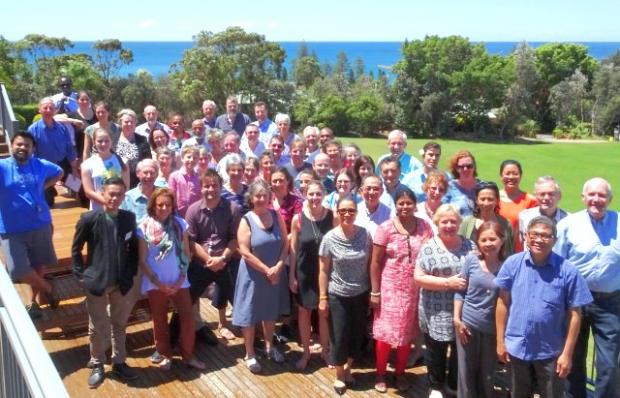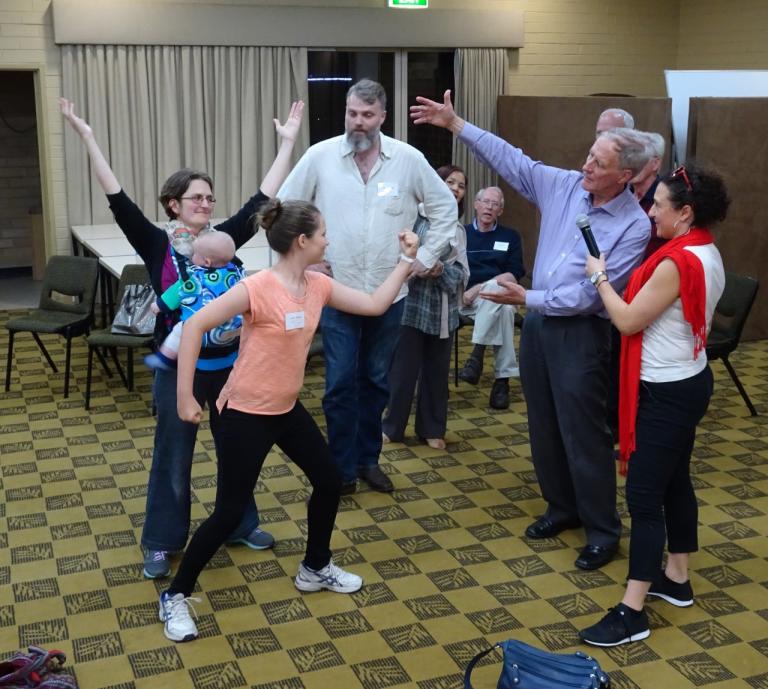Reporting back on IofC Australia’s Roadmap process
Early in the Southern Hemisphere summer, Ruby Nelson-Will sat down with Executive Officer Athalia Zwartz and assistant Kirsty Argento for an update on the Initiatives of Change (IofC) Roadmap process, and new directions.

IofC staff and volunteers gather in Collaroy, NSW, for a weekend of sharing, reflection and envisioning future directions.
Ruby reports: The IofC Australia Roadmap process launched a series of consultations around Australia in late 2016. Among the recommendations from that process, participants urged IofC to invest in programmes and training, focusing on the ‘people development’ element that enables individuals to become effective change makers’ in society.
Executive Officer Athalia Zwartz has been associated with IofC in Australia and overseas for six years, so I wanted to find out how she would sum up what IofC does in one sentence. This turned out to be a hard task, as the worldwide organization encompasses many aspects.
IofC began in the early 1900s as a network and movement of people who for many years operated under the name Moral Re-Armament (MRA). They are perhaps most recognised for their peacebuilding work among groups in conflict. The movement was active in Europe in the years following World War II, when many associated with MRA sought to build a lasting peace based on reconciliation and forgiveness among people and groups who had only recently been at war.
In 2001, the organization changed its name from MRA to Initiatives of Change (IofC) to better reflect its evolving focus. The name change was just one aspect of considering how IofC could stay relevant in today’s society.
‘A vital function of IofC has always been about connecting people and building relationships,’ said Athalia. ‘In today’s world, of increased digital connection, often accompanied by less human connection, this remains as important as ever. We need to use the communication tools available through technology, and keep building relationships.’
Besides new modes of communication, IofC has changed in its internal structure and focus. Volunteers previously made a full-time commitment to the organization, and in turn would be supported with accommodation, financing, and practical contributions. As the cohort of full-time volunteers is reaching retirement age and few new volunteers have come on board, Kirsty observed that, ‘The model of full-time volunteer service is difficult for many younger people to adopt.’ The organization therefore has moved towards a model of part-funding for some roles, and a limited number of full-time, paid roles.
In view of these changes, IofC Australia has entered into a three- to four-year development period, focusing on extending its volunteer network and seeking out new members, while looking within the existing fellowship to understand what has been its distinctive contribution to Australian society.
The consultation process involved written and oral contributions from IofC Australia’s staff, long and short-term volunteers, and the fellowship and network of friends around Australia. The process sought to identify realistic directions for the IofC programme, and to set a framework for applying its core values and ideals in the Australian context
The Road Map consultations have built on and run alongside a ‘Cultural and Structural Change’ process, facilitated by an external consultant, which has helped those involved to understand and reflect on the implicit structures and culture of the organization, and to reconnect with its core values.
Meanwhile, a series of ‘Next Step Experiments’ forms part of a new exploratory phase that is trialling a number of initiatives and programmes in a small-scale, contained fashion. Athalia explained that by experimenting in many different directions, IofC can closely monitor and gain critical feedback to determine which programmes or directions will be pursued, and which will not be. The aim, she added, is to extend the existing network and develop organic relationships with like-minded organisations and individuals. She summed up this organic way of working with a metaphor: ‘You plant a lot of seeds, you see what grows, and then you work with what grows, rather than making assumptions about what will grow.’
While I chatted with Athalia and Kirsty, it was evident that I had to change my view of how organizations ‘should’ function; clearly, IofC doesn’t fit the mould of many community-based organizations. Based on some generous bequests, IofC Australia has scope for flexibility in its structures, programmes and ways of thinking, and is able to respond to community needs that are less well recognized in the existing government systems. However, seeking adequate financing remains an issue, and IofC Australia will continue to evolve over the coming years, as its staff and supporters seek to determine the organization’s ‘best fit’, and where it may be able to offer services that are needed in Australia today.
At present, IofC Australia is developing relationships with other established community programmes and organizations. One emerging partnership is with Oaktree, a youth-led organisation for members aged 26 years and under, which is working to end global poverty. In view of the older, 60-plus cohort at IofC Australia, Athalia suggested that, ‘There is a nice synchronicity in terms of what we can offer them, and what they can offer us.’ In particular, she noted that Oaktree provides the opportunity, structure and framework for volunteer engagement in global programmes, while IofC is able to provide the cross-cultural training and mentoring to support overseas aid projects.
Turning back to the question that started our conversation, Athalia reflected that, ‘IofC is an organization, but it’s also a way of living. Change is always happening, and the IofC approach is to consider how we are responsible for the world that we live in. The starting point is the self.’

Further to these initiatives, more than 50 people gathered at the Collaroy Retreat Centre in New South Wales in November 2016 for a weekend of joint reflection on the ‘essence’ of IofC and possible future directions. The weekend was a chance for the IofC community to connect across different cities, and to make suggestions for future work. Suggestions included working with Indigenous Australians to mark 2017 as the 50th anniversary of the 1967 referendum that removed discriminatory references from the Australian Constitution, and following up on the success of the Creators of Peace 25th anniversary conference in Caux. Some participants said that the weekend had inspired a ‘recalibration’ and rethinking of their own commitments.
Participants at Collaroy take part in a game of modelling change through ‘human sculptures’.
- For more information about the Roadmap process, contact athalia.zwartz@iofc.org

